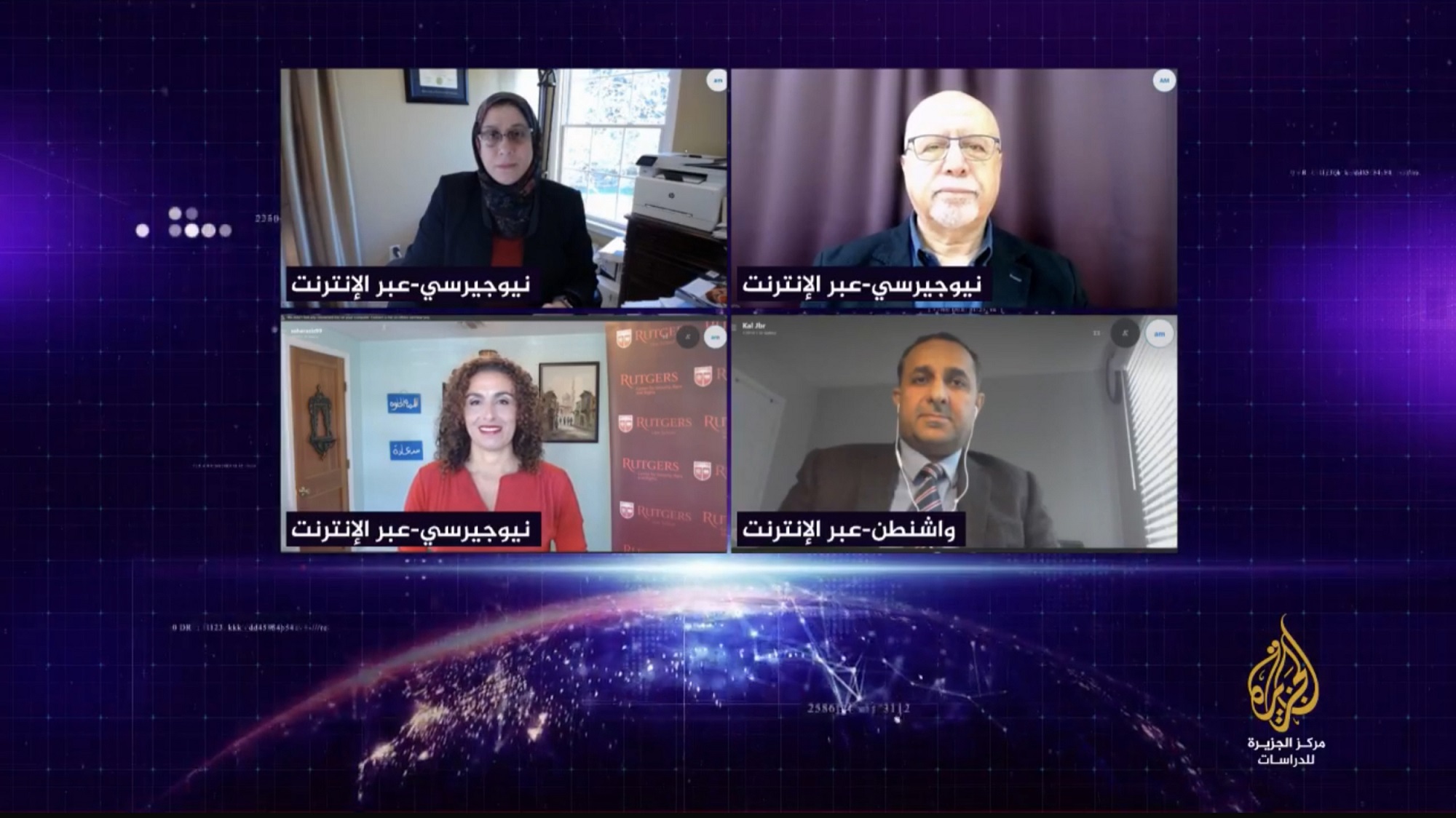
Al Jazeera Centre for Studies and Al Jazeera Mubasher hosted a webinar on Tuesday, 27 October 2020 under the title, “The impact of US election results on Middle East issues.” The webinar delved into issues relating to the US elections provoking competition between Republican candidate Donald Trump and Democratic candidate Joe Biden. The speakers were Sahar Aziz, Professor of Law, Chancellor’s Social Justice Scholar, and Middle East and Legal Studies Scholar at Rutgers University Law School; Amaney A. Jamal, Director of Mamdouha S. Bobst Center for Peace and Justice at Princeton University and Edwards S. Sanford Professor of Politics; Shibley Telhami, Anwar Sadat Professor for Peace and Development, Director of the University of Maryland Critical Issues Poll, and a nonresident senior fellow at the Brookings Institution; and Khalid al-Jaber, Director of MENA Center in Washington D.C. Al Jazeera Mubasher presenter Mohammed Dahou moderated the session.
The speakers presented the nature of the current US presidential elections and the features that distinguish them from previous elections. In this regard, they highlighted the noticeable variety of American voters’ interests and concerns, which were not as important in the past, and touching on racism, the rise of racist discourse and the rights of African Americans due to Trump’s focus on what he calls “the rights of whites,” or the majority of his electoral base.
One of the more recent issues in the current presidential elections is the belief of vast sectors of US public opinion especially among democrats that American democracy and the American system that they have known are at risk. These sentiments were attributed to President Trump’s conduct, especially his marginalization of institutions and his appointment of Republican Supreme Court Justices with conservative inclinations as well as his permanent replacement of top state officials. Nonetheless, reactions were positive as they prompted unprecedented enthusiasm and early voting, as seen in recent days.
The panellists also maintained that there are numerous crises that did not exist before that have overtaken the voter’s list of priorities and will thus affect his or her electoral behaviour. These include the Trump administration’s poor management of the coronavirus pandemic, which led to overwhelming and unexpected numbers of cases given the size and capabilities of the United States. In addition to crises occurring with the external world, especially the European Union and China, the severity of these crises was not witnessed in past decades.
As for the issues, conflicts and struggles of the Middle East, the panellists agreed that they do not concern American voters as much as the aforementioned issues do. Nonetheless, they pointed out that if Biden wins, there will not be the same amount of force towards “the deal of the century” as there is in the Trump era because most Americans believe this deal was conducted without consideration for the rights of the Palestinian people – or in other words, because it will not achieve the desired peace, which is a US interest. Because this deal, according to the panellists, did not mention the two-state solution, the halt of illegitimate settlements and so on, they predict that there will not be significant infiltration of or historical change towards the Palestinian cause. However, with regards to relations between the United States and the Palestinian Authority in particular, there may be some improvement under Biden after they had deteriorated under Trump.
This will also be the case for the rebalancing of foreign policy; the United States’ relations with countries like Iran, Turkey, Saudi Arabia and Egypt; and the United States’ attempt to reappear as the state that defends the principles of freedom and democratic values and behaves with wisdom and rationality in various dossiers and issues pertaining to these countries. They indicated, for example, that the Iranian dossier will witness improvement if Biden comes to office because he will rely more on the mechanisms of politics and diplomacy than on hard power like imposing isolation, economic pressure and renewing sanctions.
Similarly, the speakers predicted that with Biden in office, the arms race between the Gulf countries will subside relatively and that the damage done in the Gulf countries due to the blockade on Qatar and Trump’s support for the Saudi-Emirati position will be rectified. They also predicted that normalisation with Israel will not be as pressing of an issue under Biden as it is under Trump.
On human rights, participants asserted that the countries that violate them, especially in the Middle East, will be dealt with differently and with more urgency if the Democrats win. However, they believe that Joe Biden is “a realistic character” and will deal with countries that violate human rights the same way his counterparts, especially Obama, did in the past i.e. without harming US interests. In any case, human rights issues will not be of concern to the new administration regardless of who wins and will not be a priority regardless of relative improvement.
Finally, regarding Trump’s refusal to hand over power if he loses under the pretext of electoral fraud, speakers indicated that this is “possible and not improbable” and may cause an internal crisis in the country for some time. However, they affirmed that the crisis will eventually be resolved because the United States is “a state of institutions;” and the police, which is supposed to curb the protests that may result from Trump’s refusal to transfer power, falls under the authority of the state governor. Each governor is keen on maintaining peace in his or her state. Therefore, the police will not enable confrontation among state residents and will abide by the law and public interest. Furthermore, the speakers maintained that the likelihood of Trump refusing to hand over power or discrediting election results is not high if the difference in the numbers of votes are great enough to render Biden’s victory decisive and final.
For more details, watch the full webinar on AJCS’s digital platforms here:
Facbook -Twitter - Soundcloud - Youtube-Instagram